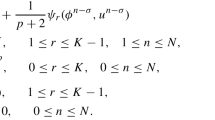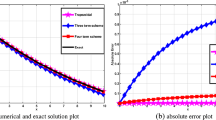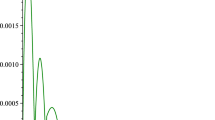Abstract
A boundary-value problem for singularly perturbed second order differential-difference equation with both the negative(delay) and positive(advance) shifts is considered and a new exponentially fitted three term finite difference scheme is proposed for the numerical approximation of its solution. An approximate version of the considered problem is constructed by the use of Taylor’s series expansion procedure first, and then, a new three term recurrence relationship is derived by applying the finite difference approximation techniques on it. Furthermore, an exponential fitting factor is introduced in the derived new scheme using the theory of singular perturbations and an efficient ’discrete invariant imbedding algorithm’ is used to solve the resulting tridiagonal system of equations. Convergence of the method is analyzed. Numerical experiments performed on several test examples; presentation of the computational results in terms of maximum absolute errors and the comparison of the results with some other method results, show the applicability and efficiency of the proposed scheme. Graphs plotted for the solution with varying shifts show the effect of small shifts on the boundary layer behavior of the solution. Both the theoretical and numerical analysis of the method reveals that the method is able to produce uniformly convergent solutions with quadratic convergence rate.








Similar content being viewed by others
References
Longtin, A., Milton, J.G.: Complex oscillations in the human pupil light reflex with “mixed” and delayed feedback. Math. Biosci. 90(1–2), 183–199 (1988)
Stein, R.B.: Some models of neuronal variability. Biophys. J. 7(1), 37–68 (1967)
Wazewska-Czyzewska, M., Lasota, A.: Mathematical models of the red cell system. Matematyta Stosowana 6(1), 25–40 (1976)
Derstine, M., Gibbs, H., Hopf, F., Kaplan, D.: Bifurcation gap in a hybrid optically bistable system. Phys. Rev. A 26(6), 3720–3722 (1982)
Kuang, Y.: Delay Differential Equations: With Applications in Population Dynamics. Academic press, Oval Road (1993)
Villasana, M., Radunskaya, A.: A delay differential equation model for tumor growth. J. Math. Biol. 47(3), 270–294 (2003)
Mackey, M.C., Glass, L.: Oscillation and chaos in physiological control systems. Science 197(4300), 287–289 (1977)
Balachandran, B., Kalmár-Nagy, T., Gilsinn, D.E.: Delay Differential Equations. Springer, New York (2009)
Bellman, R.E., Cooke, K.L.: Differential-Difference Equations. Academic Press, New York (1963)
Bellen, A., Zennaro, M.: Numerical Methods for Delay Differential Equations. Oxford University Press, New York (2013)
Orszag, S., Bender, C.M.: Advanced Mathematical Methods for Scientists and Engineers. McGraw-Hill, New York (1978)
Doolan, E.P., Miller, J.J., Schilders, W.H.: Uniform Numerical Methods for Problems with Initial and Boundary Layers. Boole Press, Dublin (1980)
Driver, R.D.: Ordinary and Delay Differential Equations. Springer, New York (1977)
Eckhaus, W.: Matched Asymptotic Expansions and Singular Perturbations. North-Holland, Amsterdam (1973)
Holmes, M.: Introduction to Perturbation Methods. Springer, Berlin (1995)
Kevorkian, J., Cole, J.: Perturbation Methods in Applied Mathematics. Springer, New York (1981)
Miller, J.J., O’Riordan, E., Shishkin, G.I.: Fitted Numerical Methods for Singular Perturbation Problems: Error Estimates in the Maximum Norm for Linear Problems in One and Two Dimensions. World Scientific, Singapore (2012)
Nayfeh, A.H.: Perturbation Methods. Wiley, New York (1979)
O’Malley Jr., R.E.: Introduction to Singular Perturbations. Academic Press, New York (1974)
Kadalbajoo, M.K., Reddy, Y.: Asymptotic and numerical analysis of singular perturbation problems: a survey. Appl. Math. Comput. 30(3), 223–259 (1989)
Lange, C.G., Miura, R.M.: Singular perturbation analysis of boundary value problems for differential-difference equations v small shifts with layer behavior. SIAM J. Appl. Math. 54(1), 249–272 (1994)
Lange, C.G., Miura, R.M.: Singular perturbation analysis of boundary-value problems for differential-difference equations vi small shifts with rapid oscillations. SIAM J. Appl. Math. 54(1), 273–283 (1994)
Lange, C.G., Miura, R.M.: Singular perturbation analysis of boundary value problems for differential-difference equations. SIAM J. Appl. Math. 42(3), 502–531 (1982)
Lange, C.G., Miura, R.M.: Singular perturbation analysis of boundary value problems for differential-difference equations iii turning point problems. SIAM J. Appl. Math. 45(5), 708–734 (1985)
Adilaxmi, M., Bhargavi, D., Phaneendra, K.: Numerical integration of singularly perturbed differential-difference problem using non polynomial interpolating function. J. Inf. Math. Sci. 11(2), 195–208 (2019)
Adilaxmi, M., Bhargavi, D., Reddy, Y.: An initial value technique using exponentially fitted non standard finite difference method for singularly perturbed differential-difference equations. Appl. Appl. Math. 14(1), 245–269 (2019)
Kadalbajoo, M.K., Kumar, D.: A computational method for singularly perturbed nonlinear differential-difference equations with small shift. Appl. Math. Modell. 34(9), 2584–2596 (2010)
Kadalbajoo, M.K., Patidar, K.C., Sharma, K.K.: \(\varepsilon \)-uniformly convergent fitted methods for the numerical solution of the problems arising from singularly perturbed general ddes. Appl. Math. Comput. 182(1), 119–139 (2006)
Kadalbajoo, M., Sharma, K.: Numerical analysis of boundary-value problems for singularly-perturbed differential-difference equations with small shifts of mixed type. J. Optim. Theory Appl. 115(1), 145–163 (2002)
Kadalbajoo, M., Sharma, K.: Numerical treatment of a mathematical model arising from a model of neuronal variability. J. Math. Anal. Appl. 307(2), 606–627 (2005)
Kadalbajoo, M.K., Sharma, K.K.: An \(\varepsilon \)-uniform convergent method for a general boundary-value problem for singularly perturbed differential-difference equations: Small shifts of mixed type with layer behavior. J. Comput. Methods Sci. Eng. 6(1–4), 39–55 (2006)
Kaur, M., Arora, G.: A review on singular perturbed delay differential equations. Int. J. Curr. Adv. Res. 6(3), 2341–2346 (2017)
Kumar, V., Sharma, K.K.: An optimized b-spline method for solving singularly perturbed differential difference equations with delay as well as advance. Neural Parallel Sci. Comput. 16(3), 371–386 (2008)
Melesse, W.G., Tiruneh, A.A., Derese, G.A.: Solving linear second-order singularly perturbed differential difference equations via initial value method. Int. J. Differ. Equ. https://doi.org/10.1155/2019/5259130 (2019)
Mohapatra, J., Natesan, S.: Uniformly convergent second-order numerical method for singularly perturbed delay differential equations. Neural Parallel Sci. Comput. 16(3), 353–370 (2008)
Mohapatra, J., Natesan, S.: The parameter-robust numerical method based on defect-correction technique for singularly perturbed delay differential equations with layer behavior. Int. J. Comput. Methods 7(04), 573–594 (2010)
Patidar, K.C., Sharma, K.K.: \(\varepsilon \)-uniformly convergent non-standard finite difference methods for singularly perturbed differential difference equations with small delay. Appl. Math. Comput. 175(1), 864–890 (2006)
Ramos, J.I.: Exponential methods for singularly perturbed ordinary differential-difference equations. Appl. Math. Comput. 182(2), 1528–1541 (2006)
Sirisha, L., Phaneendra, K., Reddy, Y.: Mixed finite difference method for singularly perturbed differential difference equations with mixed shifts via domain decomposition. Ain Shams Eng. J. 9(4), 647–654 (2018)
Kumara Swamy, D., Phaneendra, K., Reddy, Y.: Accurate numerical method for singularly perturbed differential-difference equations with mixed shifts. Khayyam J. Math. 4(2), 110–122 (2018)
Swamy, D.K., Phaneendra, K., Reddy, Y.: A fitted non standard finite difference method for singularly perturbed differential difference equations with mixed shifts. J. de Afrikana 3(4), 001–020 (2016)
Swamy, D.K., Phaneendra, K., Reddy, Y.: Solution of singularly perturbed differential difference equations with mixed shifts using galerkin method with exponential fitting. Chin. J. Math. 2016, 1–10. https://doi.org/10.1155/2016/1935853 (2016)
Protter, M.H., Weinberger, H.F.: Maximum Principles in Differential Equations. Springer, New York (1967)
Kellogg, R.B., Tsan, A.: Analysis of some difference approximations for a singular perturbation problem without turning points. Math. Comput. 32(144), 1025–1039 (1978)
Nichols, N.: On the numerical integration of a class of singular perturbation problems. J. Optim. Theory Appl. 60(3), 439–452 (1989)
Kadalbajoo, M., Sharma, K.: An \(\varepsilon \) -uniform fitted operator method for solving boundary value problems for singularly perturbed delay differential equations: Layer behavior. Int. J. Comput. Math. 80(10), 1261–1276 (2003)
Kadalbajoo, M., Reddy, Y.: Numerical integration of a class of singular perturbation problems. J. Optim. Theory Appl. 51(3), 441–452 (1986)
Author information
Authors and Affiliations
Corresponding author
Additional information
Publisher's Note
Springer Nature remains neutral with regard to jurisdictional claims in published maps and institutional affiliations.
Rights and permissions
About this article
Cite this article
Ranjan, R., Prasad, H.S. A novel approach for the numerical approximation to the solution of singularly perturbed differential-difference equations with small shifts. J. Appl. Math. Comput. 65, 403–427 (2021). https://doi.org/10.1007/s12190-020-01397-6
Received:
Revised:
Accepted:
Published:
Issue Date:
DOI: https://doi.org/10.1007/s12190-020-01397-6
Keywords
- Differential-difference equation
- Singular perturbation problem
- Boundary layer
- Stability and convergence
- Finite difference method




